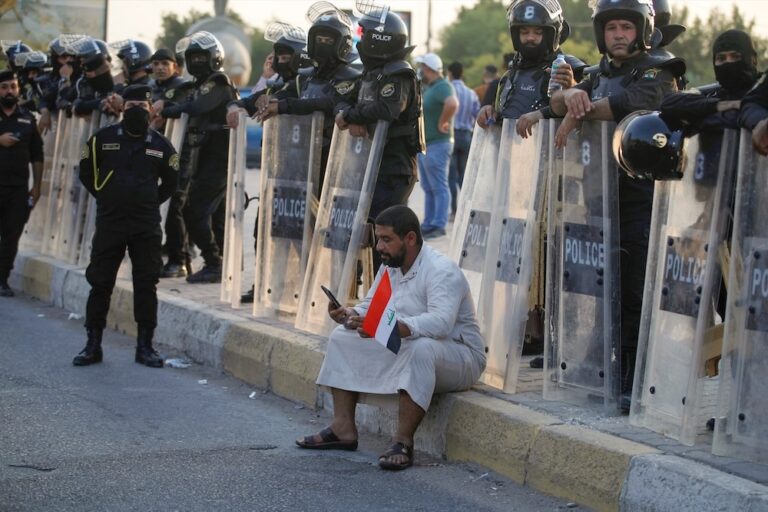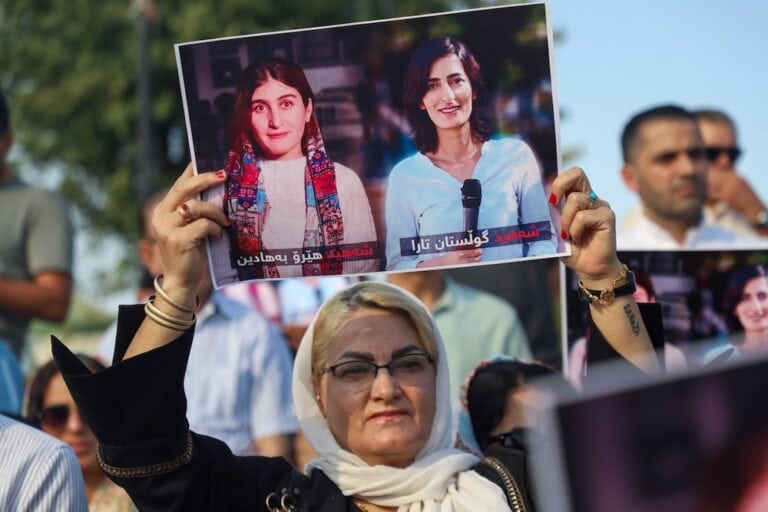(IFJ/IFEX) – The following is an IFJ media release: IFJ Calls for Release of Kidnapped Journalist As New Media Safety Crisis Unfolds In Iraq The International Federation of Journalists today called for the immediate release of James Brandon, a British newspaper reporter who was shot and then snatched from his hotel by gunmen in the […]
(IFJ/IFEX) – The following is an IFJ media release:
IFJ Calls for Release of Kidnapped Journalist As New Media Safety Crisis Unfolds In Iraq
The International Federation of Journalists today called for the immediate release of James Brandon, a British newspaper reporter who was shot and then snatched from his hotel by gunmen in the southern city of Basra.
Brandon, a freelance correspondent working for The Sunday Telegraph, is the latest victim of a wave of hostage-taking in the country. The IFJ says that the targeting of news people adds further to fears that the country is becoming ungovernable. Kidnappers have threatened to kill Brandon unless United States forces call off their assault on the city of Najaf, where fighting has been continuing for days.
“Everything must be done to try to secure the safe release of our colleague,” said IFJ General Secretary Aidan White today. “The taking of innocent civilians in this way is cowardly and horrifying. In recent days the media community in Iraq has taken a number of shocks. We see a sign of deepening crisis and failure to resolve problems without using violence.”
The IFJ says that with more than 40 media deaths since last year’s invasion, Iraq is already the world’s most dangerous place for journalists. A few days ago, the Federation protested over an official ban imposed on the Arab satellite channel Al-Jazeera. About 20 foreigners are currently being held and at least eight hostages have been executed. The IFJ is calling on all journalists in Iraq to tighten up their security.
After the kidnapping, Brandon’s kidnappers issued a video tape with militants threatening to kill him, but a spokesman for Shi’ite cleric Moqtada al-Sadr has appealed to the captors to release the reporter, who is filmed speaking directly to the camera and saying, “I’m a journalist, I just write about what is happening in Iraq.”
The IFJ says that the politics of hostage-taking is a futile and cowardly strategy and cannot deliver liberation or democracy. It also recalls that journalists are considered civilians according to international conventions.
The IFJ is calling on journalists’ groups in Iraq to join a campaign to appeal to the likely kidnappers for the release of the reporter. “We have to ensure that everyone, inside and outside the country, is doing what they can to get him freed safely,” said White.
The Federation is supporting its affiliate, the National Union of Journalists, which is pressing the UK government to act. The NUJ is already working with the Ministry of Defence on the safety of journalists, and earlier this year had a meeting with British Defence Secretary Geoff Hoon to press the case for more action to protect journalists in war zones. Co-operation was agreed on drawing up guidelines for troops to avoid attacks on journalists, and on investigating incidents when they have occurred.
The IFJ, through the International News Safety Institute, the global media safety organisation, is campaigning for similar co-operation over attacks on media people at the international level.
“We have to do more to make sure that media staff are able to work safely, whether in Baghdad or Basra,” said White. “Until our people can work freely, Iraq will be an ungovernable, dangerous state.”
The IFJ has made safety of journalists the top priority in a programme of support it has developed for Iraqi journalists in co-operation with other journalists’ groups in the Arab world. “This incident shows just how much work needs to be done,” said White.
The IFJ represents over 500,000 journalists in more than 100 countries.


